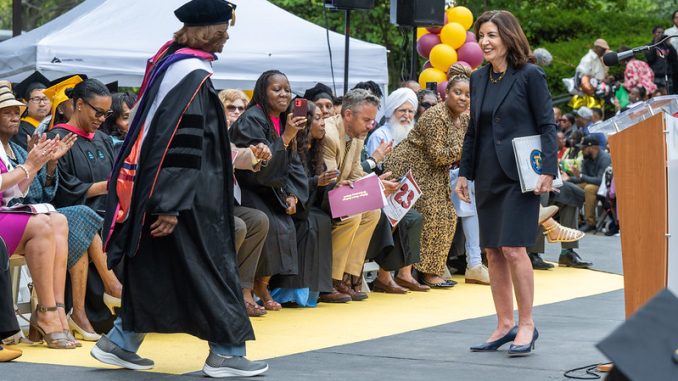
New York State Governor Kathy Hochul has financially prioritized SUNY schools and educations through her recent critical and drastic investments in education. In the published 2024 fiscal year (FY) budget, there was great unprecedented support for education in New York State. These investments, including bolstering the SUNY Transformation Fund, are aimed at attracting students and faculty as well as bolstering completion rates.
The budget invests $1.3 billion in new funding for SUNY state-operated campus capital projects with $106 million allocated for SUNY community colleges. This allows $163 million in recurring general aid for SUNY state-operated campus functions and needs, with another $75 million for one-time investments in “transformational initiatives at campuses that support innovation, help meet the workforce needs of the future, and provide needed support to students,” as outlined in Gov. Hochul’s press release regarding the budget.
Within Gov. Hochul’s expanded education budget is the SUNY Transformation Fund. The 2024 fiscal year will witness the advancement of the budget to $75 million. With this expansion comes concentrated efforts from Gov. Hochul to improve student success, support innovation, help meet workforce needs and more.
“The SUNY Transformation Fund provides an opportunity for associate and baccalaureate- granting campuses to work together to provide early shared transfer advisement, 2+2 degree pathways and joint program delivery to help students move between campuses,” explained by SUNY’s Transfer Pathways Fact Sheet. SUNY New Paltz is involved in such initiatives, with plans to build up programming and communication support on campus. This includes the hiring of a specific advisor to assist transfer students with the transition from their community college to SUNY New Paltz and make for a cleaner, more effective change in education.
Each campus that receives allocations from the Transformation Fund are required to put at least half of the money toward two separate but complementary financial efforts. Requiring such concentrated efforts, Gov. Hochul is supporting not just SUNY institutions but the student-directed aid and opportunities the schools provide.
The first required field of spending is enhancing economic mobility through expansion of education and workforce training opportunities, which entails expanding involvement and partnership with more specific and high-demand fields. This ranges from semiconductor-related professions, AI and other high-tech fields. Also, enhancing mobility requires increasing opportunities for students and adult learners aligned with regional needs.
Second, campuses are required to put money into increasing retention and completion of degree-seeking students. This is done most commonly on SUNY campuses via expansions of support programs such as Accelerated Study in Associate Programs (ASAP) and Accelerate. Complete, and Engage (ACE). ASAP/ACE support ranges from tuition waivers, funding to help with schooling expenses, academic assistance and more. These programs have been proven in randomized, controlled trials to “significantly improve associate and bachelor’s degree completion rates and help close opportunity gaps.”
Additionally, up to half of the projects may include three initiatives identified when explaining the financial plans submitted prior to receiving from the Transformation Fund. First, campuses may put efforts toward expanding or launching more clearly-defined and easy transfer pathways to improve advisement programs and credit evaluation. This helps link four-year SUNY institutions with community colleges and encourages the completion of bachelor’s degrees.
Second, SUNY campuses with funds are able to spend up to half of the allocated money on increasing operational efficiency; streamlining the delivery of services helps campuses run smoother and aids in the realizations of cost savings for schools. Third, funds can be put toward delivering “essential student support for targeted underserved populations.” Efforts regarding this essential support includes addressing food insecurity, mental health issues and transportation solutions using evidence-based models. Students receiving this support range from Pell recipients, veterans, students with disabilities, those struggling with housing insecurity and other students recognized as requiring further support using the Transformation Fund allocation.
Gov. Hochul’s enacted budget also created the first-ever New York State matching fund, which are funds designated to be paid in proportion to funds from another source. In this instance, Gov. Hochul’s budget provides $1 in state funds for every $2 contributed to university endowments, going up to $500 million. The budget also provides a $138 million funding floor, meaning the lowest limit accepted or guaranteed. This funding floor is in place to maintain current community college funding levels while also looking to expand transfer support and success after switching to baccalaureate-granting SUNY institutions.
53% of full-time in-state students attend SUNY schools tuition-free because of “ongoing support” from Gov. Hochul and state legislators. Education continues to grow in expense and requires funding, but from this budget SUNY institutions look to establish safeguards against potential growth in education disparities and unequal opportunities when it comes to higher education.
“Quality public higher education is an engine of social mobility that has the power to change lives,” Gov. Hochul declared. While the SUNY Transformation Fund is not the only initiative to present greater opportunities and expansions to campuses in order to support students, allocations from the $75 million across schools will directly aid in furthering growth processes.
SUNY Chancellor John B. King praised the developments in support of SUNY schools and educations, stating “SUNY saw an unprecedented investment to bolster systemwide and campus initiatives, opening the doors to a college education for all New Yorkers. Through the Transformation Fund, SUNY and our 64 campuses will fund evidence-based strategies that prepare more students for careers in high-demand jobs, and that overcome obstacles preventing students from completing their education in a timely manner.”
